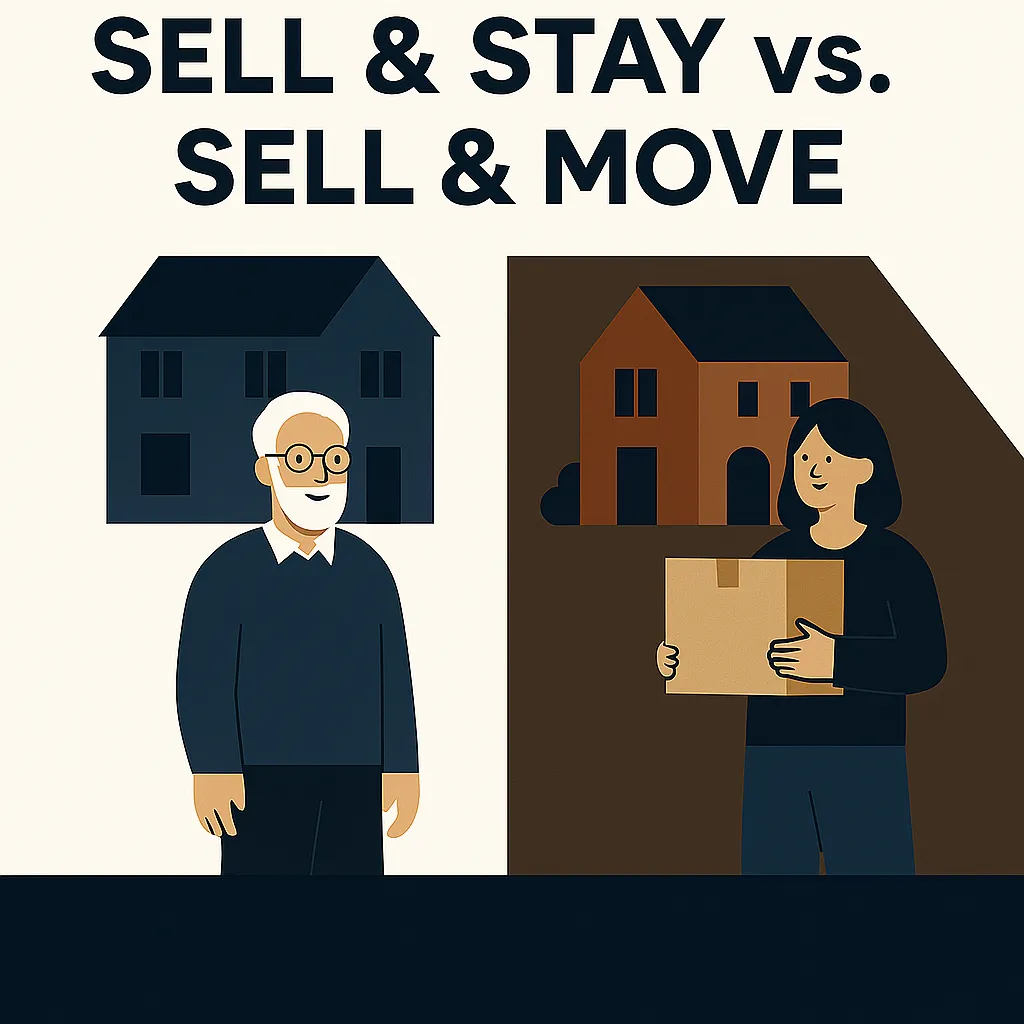
Sell & Stay vs. Sell & Move: Which Option Fits Your Situation?
When money gets tight, it can feel like there are only bad choices. The truth? You have options. Two of the most practical: Sell & Stay (a sale-leaseback) or Sell & Move (a straightforward sale with a clean reset). This guide explains both in plain English so you can choose confidently.
TL;DR — Fast Comparison
Sell & Stay is best for homeowners who love their home or neighborhood but need payment relief. You keep living in the property because you become the tenant under a leaseback agreement. This option often provides quick access to your home’s equity while offering medium-to-high flexibility, depending on your lease terms.
Sell & Move is a better fit if you’re ready for a fresh start or want to lower your cost of living. In this case, you sell your home outright, you don’t remain in it afterward, and you usually receive your equity faster. It gives you the highest level of flexibility to relocate or reset your finances.
What “Sell & Stay” really means
With Sell & Stay, you sell your home to a capital partner and lease it back so you don’t have to move. You convert equity to cash, stabilize your month-to-month, and keep your routines (schools, commute, neighbors). It’s not a loan, and there’s no new mortgage payment. Learn more: /sell-stay
Good signs it fits you:
You want to stay put and avoid the cost/chaos of moving.
You need cash liquidity (to catch up, consolidate, or breathe).
The house still suits your life if payments are right-sized.
Considerations:
You’ll have a lease; read it carefully (rent, term, renewals, tenant responsibilities).
Taxes/insurance/repairs are handled per the lease—clarity matters.
If you hope to buy back later, make sure any future-purchase terms are in writing in an Option Agreement prior to signing any contracts.
When “Sell & Move” makes more sense
Sometimes the best move… is moving. If your current home no longer fits (cost, size, location), Sell & Move can free you to reset your budget and life. Learn more: /sell-move
Good signs it fits you:
You want lower monthly expenses or a new location.
You’re ready for a clean slate—no leaseback, no strings.
The home needs more work than you want to tackle.
✏️ A quick decision checklist (ask yourself)
Is staying here still right for my family?
What’s my top priority—stability, speed, or maximum cash?
How much equity do I need to unlock right now?
Will a lease payment fit my budget comfortably?
Can I feasibly commit to making the lease payments every month?
If there is a repurchase option, can I feasibly come up with the money I need to repurchase the home before the expiration of the Option Agreement?
Am I emotionally ready to move if the numbers say it’s best?
Common myths, answered
“Sale-leaseback hurts my credit like a foreclosure.”
No—this is a sale + lease, not a missed payment. (Avoiding a foreclosure can actually help your long-term credit path.)
“If I sell and lease back, I’ll have zero protections.”
Leases are contracts. Make sure you understand rent, term, renewal options, responsibilities, and any future-purchase rights before signing.
“Home Equity Agreements are the same thing.”
Different! HEAs trade a portion of future value for cash today with no monthly payments. Learn more: /hea
The bottom line
If you love your home and want breathing room, Sell & Stay may be ideal. If you want a new chapter (or lower fixed costs), Sell & Move might be the smarter reset. Either way, you don’t have to navigate it alone.
Next step (free, no pressure):
Book a short Discovery Call. We’ll talk through your numbers, your goals, and which path fits—then you decide.
Compliance note: We’re not a law firm, lender, or financial advisor. This article is general information—please consult your own legal or financial professionals for advice specific to you.
